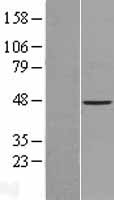ACTL7B (NM_006686) Human Tagged ORF Clone
CAT#: RC207474
ACTL7B (Myc-DDK-tagged)-Human actin-like 7B (ACTL7B)
"NM_006686" in other vectors (4)
Specifications
| Product Data | |
| Type | Human Tagged ORF Clone |
| Tag | Myc-DDK |
| Symbol | ACTL7B |
| Synonyms | Tact1 |
| Vector | pCMV6-Entry |
| E. coli Selection | Kanamycin (25 ug/mL) |
| Mammalian Cell Selection | Neomycin |
| Sequence Data |
>RC207474 ORF sequence
Red=Cloning site Blue=ORF Green=Tags(s) TTTTGTAATACGACTCACTATAGGGCGGCCGGGAATTCGTCGACTGGATCCGGTACCGAGGAGATCTGCC GCCGCGATCGCC ATGGCGACAAGGAACAGCCCCATGCCCCTGGGCACGGCTCAGGGTGACCCTGGAGAGGCAGGAACACGGC CCGGCCCTGACGCCAGCCTCCGGGACACAGGTGCGGCCACTCAGCTCAAGATGAAGCCCAGGAAGGTGCA CAAGATCAAGGCGGTCATCATCGACCTGGGCTCCCAGTACTGCAAGTGCGGCTACGCGGGAGAGCCGAGG CCCACCTACTTCATCTCCTCCACCGTGGGCAAACGCTGCCCCGAGGCGGCCGACGCTGGCGACACCCGCA AGTGGACTTTAGTGGGCCATGAGCTGCTCAACACGGAGGCGCCTCTCAAGCTGGTGAACCCGCTGAAGCA CGGCATCGTGGTGGACTGGGACTGCGTGCAGGACATCTGGGAGTACATCTTCCGCACCGCCATGAAGATC CTCCCCGAGGAGCACGCTGTGCTGGTCTCCGACCCTCCGCTCAGCCCCAGCAGCAACCGGGAGAAGTACG CGGAGCTCATGTTTGAGACCTTCGGCATCCCAGCCATGCACGTGACGTCCCAGTCGTTGCTGTCCATCTA CTCCTACGGCAAGACCTCGGGGCTGGTGGTGGAGAGCGGGCACGGCGTCTCGCACGTGGTGCCCATATCC GAGGGCGACGTGCTGCCGGGCCTGACCAGCCGCGCCGACTACGCTGGGGGTGACCTCACCAACTACCTGA TGCAGCTGCTCAATGAGGCGGGCCACGCATTCACGGACGACCACCTGCACATCATAGAGCACATCAAGAA GAAGTGCTGCTATGCGGCCTTCCTGCCCGAGGAGGAGCTGGGCCTGGTCCCGGAGGAGCTGCGCGTGGAC TACGAGCTCCCGGACGGCAAACTCATCACCATTGGCCAGGAGCGCTTCCGTTGCTCTGAGATGCTCTTCC AGCCCTCCCTGGCAGGCAGCACCCAGCCGGGCCTCCCGGAGCTCACAGCTGCCTGCCTGGGCCGCTGCCA GGACACGGGCTTCAAGGAGGAGATGGCCGCCAACGTGCTACTGTGTGGCGGCTGCACTATGCTGGATGGC TTCCCCGAGCGCTTCCAGAGGGAGCTGAGCCTCCTCTGCCCCGGGGACAGCCCTGCAGTGGCTGCCGCTC CTGAGAGGAAGACCTCCGTGTGGACCGGCGGTTCCATCCTGGCCTCCCTGCAGGCCTTCCAACAGCTCTG GGTCAGCAAGGAAGAGTTTGAGGAGCGGGGCAGCGTGGCCATCTACAGCAAGTGC ACGCGTACGCGGCCGCTCGAGCAGAAACTCATCTCAGAAGAGGATCTGGCAGCAAATGATATCCTGGATT ACAAGGATGACGACGATAAGGTTTAA >RC207474 protein sequence
Red=Cloning site Green=Tags(s) MATRNSPMPLGTAQGDPGEAGTRPGPDASLRDTGAATQLKMKPRKVHKIKAVIIDLGSQYCKCGYAGEPR PTYFISSTVGKRCPEAADAGDTRKWTLVGHELLNTEAPLKLVNPLKHGIVVDWDCVQDIWEYIFRTAMKI LPEEHAVLVSDPPLSPSSNREKYAELMFETFGIPAMHVTSQSLLSIYSYGKTSGLVVESGHGVSHVVPIS EGDVLPGLTSRADYAGGDLTNYLMQLLNEAGHAFTDDHLHIIEHIKKKCCYAAFLPEEELGLVPEELRVD YELPDGKLITIGQERFRCSEMLFQPSLAGSTQPGLPELTAACLGRCQDTGFKEEMAANVLLCGGCTMLDG FPERFQRELSLLCPGDSPAVAAAPERKTSVWTGGSILASLQAFQQLWVSKEEFEERGSVAIYSKC TRTRPLEQKLISEEDLAANDILDYKDDDDKV |
| Chromatograms |
CHROMATOGRAMS
 Sequencher program is needed, download here. |
| Restriction Sites |
SgfI-MluI
Cloning Scheme for this gene
Plasmid Map

|
| ACCN | NM_006686 |
| ORF Size | 1245 bp |
| OTI Disclaimer | The molecular sequence of this clone aligns with the gene accession number as a point of reference only. However, individual transcript sequences of the same gene can differ through naturally occurring variations (e.g. polymorphisms), each with its own valid existence. This clone is substantially in agreement with the reference, but a complete review of all prevailing variants is recommended prior to use. More info |
| OTI Annotation | This clone was engineered to express the complete ORF with an expression tag. Expression varies depending on the nature of the gene. |
| Product Components | The ORF clone is ion-exchange column purified, transfection-ready dried plasmid DNA, and shipped with 2 vector sequencing primers. |
| Reconstitution | 1. Centrifuge at 5,000xg for 5min. 2. Carefully open the tube and add 100ul of sterile water to dissolve the DNA. 3. Close the tube and incubate for 10 minutes at room temperature. 4. Briefly vortex the tube and then do a quick spin (less than 5000xg) to concentrate the liquid at the bottom. 5. Store the suspended plasmid at -20°C. The DNA is stable for at least one year from date of shipping when stored at -20°C. |
| Reference Data | |
| RefSeq | NM_006686.1, NM_006686.2, NM_006686.3, NP_006677.1 |
| RefSeq Size | 1408 bp |
| RefSeq ORF | 1248 bp |
| Locus ID | 10880 |
| MW | 45.2 kDa |
| Gene Summary | The protein encoded by this gene is a member of a family of actin-related proteins (ARPs) which share significant amino acid sequence identity to conventional actins. Both actins and ARPs have an actin fold, which is an ATP-binding cleft, as a common feature. The ARPs are involved in diverse cellular processes, including vesicular transport, spindle orientation, nuclear migration and chromatin remodeling. This gene (ACTL7B), and related gene, ACTL7A, are intronless, and are located approximately 4 kb apart in a head-to-head orientation within the familial dysautonomia candidate region on 9q31. Based on mutational analysis of the ACTL7B gene in patients with this disorder, it was concluded that it is unlikely to be involved in the pathogenesis of dysautonomia. Unlike ACTL7A, the ACTL7B gene is expressed predominantly in the testis, however, its exact function is not known. [provided by RefSeq, Jul 2008] |
Documents
| Product Manuals |
| FAQs |
Resources
Other Versions
| SKU | Description | Size | Price |
|---|---|---|---|
| SC122757 | ACTL7B (untagged)-Human actin-like 7B (ACTL7B) |
USD 310.00 |
|
| RG207474 | ACTL7B (GFP-tagged) - Human actin-like 7B (ACTL7B) |
USD 460.00 |
|
| RC207474L3 | Lenti ORF clone of Human actin-like 7B (ACTL7B), Myc-DDK-tagged |
USD 620.00 |
|
| RC207474L4 | Lenti ORF clone of Human actin-like 7B (ACTL7B), mGFP tagged |
USD 620.00 |
{0} Product Review(s)
Be the first one to submit a review






























































































































































































































































 Germany
Germany
 Japan
Japan
 United Kingdom
United Kingdom
 China
China




